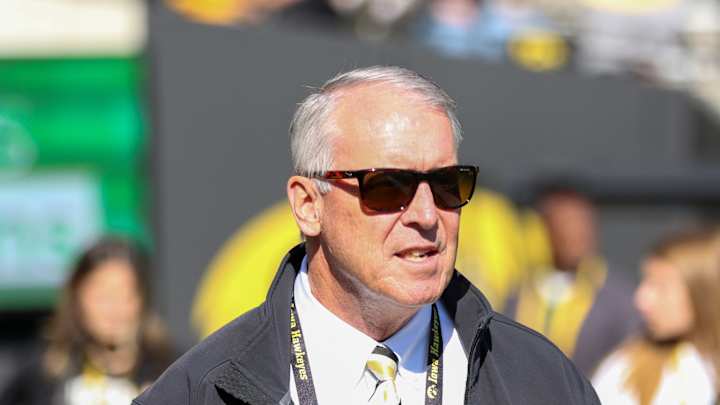Howe: Gary Barta Missed Opportunities

In this story:
IOWA CITY, Iowa - In the end, we all leave a legacy. They're often complicated. That's certainly the case for Power 5 athletics directors.
Bob Bowlsby left one after leading the department at the University of Iowa from 1990-2006. Gary Barta has left one with his retirement announcement from the same position on Friday. It ended the fifth longest tenure among P5 ADs.
Barta carried the Hawkeyes into a world with social media, outlandish TV contracts, conference expansion, a pandemic, the transfer portal and NIL after replacing Bowlsby. His hands were usually full.
The official university press release highlights much of the good. There was plenty of it.
Credit Barta for success on the field and in helping raise funds. It helped pay coaches who won and build some of the best athletic facilities in the Big Ten.
Those results satisfy a section of the fan base. Hawkeye Nation's low approval rating for Barta lets us know there's more to it than that. There should be.
In the end, the bad outweighed the good with Barta when judging what's most important. For his $1M annual salary, the department lost more than $10M in lawsuits and too many lives were negatively impacted.
Survival depended on supporting the football program, no matter what. He did that. It insulated him.
Hawkeye Football rewarded his support. During the last decade, it's won the 16th most games among FBS programs. The 86 victories rank ahead of Penn State (85), and behind only Ohio State (116), Wisconsin (92) and Michigan (87).
That's impressive and very, very important in the big business of major college athletics. Asses remain in the seats, merchandise sells, and donations and TV revenue continue rolling in.
Even though Barta and head football coach Kirk Ferentz didn't always see eye to eye, having each other's back was in the best interest of both men. They were the longest-tenured AD-coach duo in Power 5 football and trusted by the school's administration.
Barta succeeded in hiring good coaches, for the most part. Ferentz, women's basketball's Lisa Bluder and wrestling's Tom Brands were already here when he arrived. He's stuck with them and Ferentz during bumps in the road, and ultimately been rewarded with achievement and record crowds.
Joey Woody (track/XC), Rick Heller (baseball) and Lisa Cellucci (field hockey) are among the coaches hired by Barta who have programs with strong foundations. Again, if you're viewing it through a competitive lens, he leaves Iowa's athletics department in excellent shape.
The hope would be his successor performs better away from the field of play. There's plenty of room for growth there.
Google "Barta lawsuit." A trip down that rabbit hole reveals the troubling details.
During Barta's tenure, Iowa lost $6.5M in settling a gender and sexual orientation discrimination lawsuit with former athletic administrator Jane Meyer and former field hockey coach Tracey Griesbaum. He blamed a lack of documentation detailing alleged missteps by the employees for Iowa losing and showed little remorse for his actions.
Iowa's press release credited Barta for his involvement in naming the Kinnick Stadium field after the legendary Duke Slater in 2021. The irony there was that it resulted from his mismanagement, magnified by two studies finding racial bias in the Iowa Football program. The school settled a racial discrimination lawsuit awarding more than $4M to a group of former football student-athletes in March.
An '18 study alerted him to Black football players being judged differently than their white counterparts. Former center James Daniels, who took part in the study, visited him in his office, putting the issues into context. Other than easing of a few dress codes, little was done until Daniels and more than 40 former Hawkeyes called the program out during the summer of '20.
That led to paying more than $1M to former strength coach Chris Doyle, who was most often implicated for mistreatment by former players. An external study that summer confirmed the racial bias in the football program shown in the '18 internal study. It turned out to be a pattern for Ferentz's program.
Barta could have done more in '18 (or before) for Black student-athletes by demanding more change from the football staff. Instead, significant changes didn't occur until James Daniels and others went public two years later. It would have remained status quo had they not come forward.
A decision by Barta to eliminate women's swimming in '20 was reversed amid a lawsuit by student-athletes in the program charging gender discrimination. He and Iowa had no choice. They had another loser on their hands.
These incidents all highlight Barta missing opportunities to write a special legacy. He could have led meaningful progress. Instead, his left a pattern of poor decisions.
